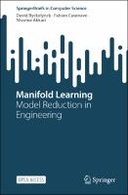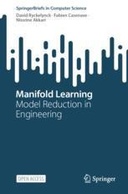Explore

Manifold Learning
0 Ungluers have
Faved this Work
Login to Fave
This Open Access book reviews recent theoretical and numerical developments in nonlinear model order reduction in continuum mechanics, being addressed to Master and PhD students, as well as to researchers, lecturers and instructors. The aim of the authors is to provide tools for a better understanding and implement reduced order models by using: physics-based models, synthetic data forecast by these models, experimental data and deep learning algorithms. The book involves a survey of key methods of model order reduction applied to model-based engineering and digital twining, by learning linear or nonlinear latent spaces. Projection-based reduced order models are the projection of mechanical equations on a latent space that have been learnt from both synthetic data and experimental data. Various descriptions and representations of structured data for model reduction are presented in the applications and survey chapters. Image-based digital twins are developed in a reduced setting. Reduced order models of as-manufactured components predict the mechanical effects of shape variations. A similar workflow is extended to multiphysics or coupled problems, with high dimensional input fields. Practical techniques are proposed for data augmentation and also for hyper-reduction, which is a key point to speed up projection-based model order reduction of finite element models. The book gives access to python libraries available on gitlab.com, which have been developed as part of the research program [FUI-25] MORDICUS funded by the French government. Similarly to deep learning for computer vision, deep learning for model order reduction circumvents the need to design parametric problems prior reducing models. Such an approach is highly relevant for image-base modelling or multiphysics modelling.
This book is included in DOAB.
Why read this book? Have your say.
You must be logged in to comment.
Rights Information
Are you the author or publisher of this work? If so, you can claim it as yours by registering as an Unglue.it rights holder.Downloads
This work has been downloaded 73 times via unglue.it ebook links.
- 23 - epub (None) at Unglue.it.
- 28 - pdf (None) at Unglue.it.
Keywords
- artificial intelligence
- Business applications
- computational mechanics
- Computer science
- Computing & information technology
- data augmentation
- deep learning
- Digital Twining
- Dimensionality Reduction
- Engineering thermodynamics
- GenericROM Library
- High-Fidelity Model
- hyper-reduction
- Image-based Digital Twins
- Machine learning
- manifold learning
- Materials science
- Mathematical & Statistical Software
- Mathematical physics
- Mathematics
- Mathematics & science
- Mechanical engineering & materials
- model order reduction
- Mordicus
- Multiphysics Modeling
- Physics
- Probability & statistics
- Production engineering
- Technology, engineering, agriculture
- thema EDItEUR::P Mathematics and Science::PB Mathematics::PBT Probability and statistics
- thema EDItEUR::P Mathematics and Science::PH Physics::PHU Mathematical physics
- thema EDItEUR::U Computing and Information Technology::UF Business applications::UFM Mathematical and statistical software
- thema EDItEUR::U Computing and Information Technology::UY Computer science::UYQ Artificial intelligence::UYQM Machine learning
Links
DOI: 10.1007/978-3-031-52764-7web: https://link.springer.com/book/10.1007/978-3-031-52764-7
Editions



